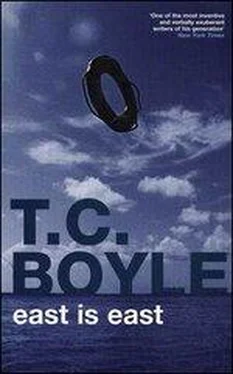She went back to her other house, the big house, before the sun was out of the trees, and later she brought him rolls and fruit and meat cut in strips. While he ate, she sat down at her typewriter and began hammering away at the keys with a furious racket. After an hour or so, during one of the long pauses in which she stared out the window and murmured to herself in a faraway voice, he cleared his throat and asked her what it was she was writing.
“A story,” she said, without looking up.
“Thriller?”
“No.”
“Love story?”
She turned in her chair to look at him. He was sprawled in the loveseat, thumbing through a news magazine—crack, AIDS, children gunned down in the schoolyard—bored to the very roots of his hair. “It’s a tragedy,” she said, “very sad,” and she pantomimed the emotion with a downturned mouth.
He thought about that for a moment as she went back to her typing. A tragedy. Of course. What else? Life was a tragedy. “About what?” he asked, though he knew he was keeping her from her work and he felt guilty about it.
“A Japanese,” she said, without turning her head. “In America.”
This was a surprise, and before he had a chance to absorb it, he blurted, “Like me?”
Now she turned. “Like you,” she said, and then she was typing again.
At lunchtime he went outside and crouched in the bushes until the hakujin with the stiff back and wirebrush hair had hung the lunch bucket on its hook and marched back up the path and out of sight. Ruth wouldn’t touch the food at first—little sandwiches of cucumber and sausage, with fresh-cut vegetables and raspberries in cream for dessert—but he insisted. He was half crazed with hunger, but he felt so guilty and he owed her so much—and so much more after last night—that he couldn’t see her deprived. She was so skinny, and all because of him. “We share,” he said, going down on his knees before her and touching his forehead to the floor, “please.”
She laughed when she saw him prostrate himself, and finally she gave in, pushing her typewriter aside and clearing a place on her worktable. They ate in silence, but he saw, with gratitude, with love, that she left him the lion’s share. While he was clearing up and she lingered over a cigarette, he broke the silence with a question that suddenly and unaccountably popped into his head: “Rusu, please and forgive me: how old are you?”
She threw back her head to draw at the cigarette, exhaling the answer: “Twenty-nine.”
“You divorce?”
She shook her head. “Never married.”
He took a moment with this, brushing crumbs from the table, crossing the room to lean out the door and replace the lunch bucket on its hook. “In Japan,” he said, “a woman is married at twenty-four. For a man, twenty-eight.”
Ruth was smiling, a sly sardonic look in her eye, and he had a sudden vision of her in the Big Apple, in a townhouse with a bathtub the size of his obāsan’s apartment, pictures on the walls, chrome and leather furniture and the ubiquitous deep-pile rug, and he saw himself coming home to her there, a salaryman in suit and tie and carrying a neat calfskin briefcase. “And how old are you?” she asked.
He was twenty. Just. But he looked older, he knew he did, and he didn’t want to disappoint her with the disparity in their ages. “Thirty-one,” he said.
Her eyebrows lifted. Twin plumes of smoke escaped her nostrils. “Really?” she said. “Three years past the limit. I’m surprised at you, Hiro—you ought to be married yourself.”
* * *
She spent nearly all of the next few days with him, returning to the big house only to sleep at night. He didn’t ask her about that, about the sleeping arrangements, and he was still tentative around her. He wanted her, and he tried to tell her that with his eyes or by casually brushing against her as she rose from her desk. At one point, after watching her work through all the interminable hours of the day, he came up behind her and laid a hand on her shoulder. “Not now,” she said, pulling him to her for one of those quick pecking kisses the Americans are so fond of, “I’m still working.” Later, when she came back from the big house with dinner for them both, he made a mute appeal—a movement of the hands, a slow melt of the eyes—and she saw it, and acknowledged it, but she told him she wasn’t feeling very well. “The heat,” she said, and she deflected the whole subject of their involvement with a question about Japan: was it this hot over there?
And then one evening she went back to the big house for cocktails and she didn’t return. It was seven and his stomach was growling. It was eight and the sun was gone and he began to give up hope. But then maybe—just maybe—she’d be back in the night. He waited for hours, brooding. What did she want with him, anyway? Was it all a game to her, a joke? And when was she going to fulfill her promise, when was she going to get him out of this stinkhole? He felt bitter sitting there in the dark without her—bitter, and though he wouldn’t admit it to himself, jealous too—and he forgot all about his gratitude and the debt he owed her, and he got up from the rocker and flicked on the light over her desk.
There it was: her story. One page in the typewriter, the others scattered across the desk as if they’d been dropped there by a sudden gust of wind, pages x’d out, scrawled over, stained with coffee and ink. How many times had he straightened them up for her, how many times had he arranged her pens and pencils and rinsed her coffee cup? He’d never looked at a word. Not because he wasn’t curious, but because he was ashamed to. How could he violate her privacy like that after all she’d done for him? That’s how he thought, that’s how his obāsan had raised him. But now, having sat and brooded in the dark and with the jealousy of the lover on him, he thought differently. He didn’t give a damn for her privacy. He sat down, shuffled the pages, and began to read:
He was a Japanese male in the full flower of Japanese manhood, solid and unyielding, and he came home from the office in the small hours and tore at her kimono. The children were asleep, the Sony silent, the tiny apartment polished like a knife. Michiko went wet at the first touch of him. There was whiskey on his breath, imported whiskey, the whiskey he drank each night at the hostess bar, and the smell of it excited her. She loved him for the moon of his face and the proud hard knot of his belly as it pressed against hers, and for his teeth, especially for his teeth. They overlapped like joy and sorrow, the path to his smile as tortuous as a trail torn across the face of Mount Fuji.
He forced himself into her and a cry escaped her lips. “Hiro,” she moaned, clinging to him, holding fast as if she were drowning, “Hiro, Hiro, Hiro!”
Hiro glanced up from the page. The room looked strange to him suddenly, looked like a cage, the walls closing in on him, the lamplight cinching his wrists. He didn’t have the heart to read on.
* * *
“When?” he demanded.
She was unpacking groceries, groceries enough for an army, for a siege, enough to keep an animal sleek in its pen for a month at least. “I told you: Sax’s car is a pickup. I need a car with a trunk, to hide you.” Her elbows jumped; the cans mounted on the table. “His mother’s car is what I’m thinking of. I just have to come up with an excuse to borrow it.”
“You stall, Rusu. You want to keep me here. You want to make me a prisoner.”
The light, the jungle light, was in her hair, slicing at her eyes. She dug into the backpack for another tin of fish. “You prefer it out there?”
“When, Rusu?” he repeated.
Читать дальше











